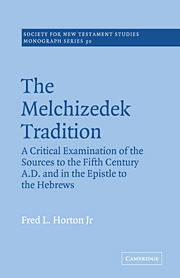 The Melchizedek Tradition
The Melchizedek Tradition Book contents
- Frontmatter
- Contents
- Preface
- Abbreviations
- 1 Introduction
- 2 The Background Sources I: The Old Testament
- 3 The Background Sources II: Philo, Qumran, and Josephus
- 4 The Later Sources I: The Early Church and the Rabbis
- 5 The Later Sources II: Gnosticism
- 6 Conclusion: Melchizedek and the Epistle to the Hebrews
- Select Bibliography
- Indexes
6 - Conclusion: Melchizedek and the Epistle to the Hebrews
Published online by Cambridge University Press: 16 October 2009
- Frontmatter
- Contents
- Preface
- Abbreviations
- 1 Introduction
- 2 The Background Sources I: The Old Testament
- 3 The Background Sources II: Philo, Qumran, and Josephus
- 4 The Later Sources I: The Early Church and the Rabbis
- 5 The Later Sources II: Gnosticism
- 6 Conclusion: Melchizedek and the Epistle to the Hebrews
- Select Bibliography
- Indexes
Summary
INTRODUCTION
Up until now I have refrained from saying anything at all about the figure of Melchizedek in the Epistle to the Hebrews so that we might first understand the sources which might be useful to us in dealing with Hebrews. Chronologically, of course, this chapter belongs between Chapters 3 and 4 since the Epistle is the ideal dividing point between what I have termed the ‘background sources’ and the ‘later sources’. Interest in the figure of Melchizedek in Hebrews has, however, been only one concern of this study. The other concern is to trace the growth and development of tradition about Melchizedek, moving from a relatively minor position within the Old Testament to divine status in some materials. Hence, although this concluding chapter has the function of telling the reader something about the way in which Melchizedek is used in Hebrews, it also has the function of pulling together the material which we have examined and pointing to its ultimate origin. Both as a matter of convenience and for reasons of substance which will become obvious I shall proceed to my topic through a discussion of Heb. vii. 3 and move outwards to encompass the entire range of material.
HEBREWS VII. 3
We have already seen above that Heb. vii. 3 stands behind every Christian heresy which speculated about Melchizedek, at least as far as such heresies are known to us. In the modern period scholarly discussion about Melchizedek has continued to cluster often around this single verse.
- Type
- Chapter
- Information
- The Melchizedek TraditionA Critical Examination of the Sources to the Fifth Century A.D. and in the Epistle to the Hebrews, pp. 152 - 172Publisher: Cambridge University PressPrint publication year: 1976


